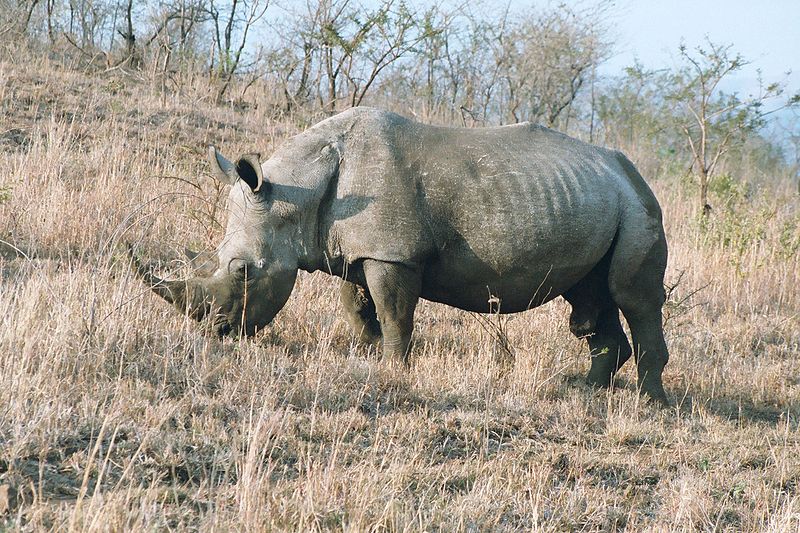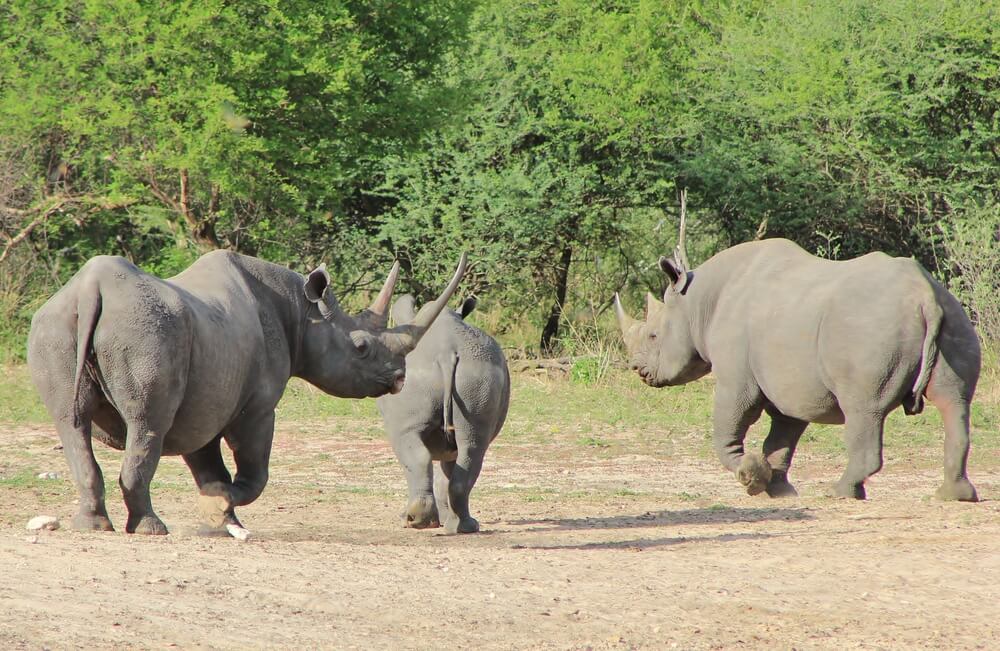The UN Council recently passed a resolution according to which the international trade in wild animals and their parts and the trade in wood derived from protected and rare trees are declared organized crimes.

In recent years there has been a dramatic increase in poaching, especially in Africa. Many claim that the crime is driven by the growing demand in Asia. In the last decade there was a 5000% increase in rhino poaching in South Africa alone.
These days it became known that the last rhinos in the Limpopo Reserve have been slaughtered. The elephant hunter also reaches "peaks" when every year about 30 thousand elephants are killed. At the same time, about a third of the wood products on the world market come from protected trees that were cut down illegally.
Now, at a good time and to the joy of green groups, the UN Council has decided that "the international trade in wild animals and their parts and the trade in wood derived from protected and rare trees, are declared an organized crime". The decision was published at the end of April 2013.
As I recall, several months ago there was a decision in the Security Council to investigate the connection between terrorist ("militia") groups and the killing of wild animals https://www.hayadan.org.il/un-security-council-against-elephant-killing-140113/. Now added to this decision is the council's statement that will give the supervisory and legal authorities tools to fight against poaching and the destruction of forests and against traders who encourage damage to the environment.
Crimes related to the illegal trade in plants and animals constitute one of the more significant types of "trade". The turnover of the "black" trade is estimated at 17 billion dollars a year, which places the trade in the fourth "honorable" place in the movement of "black" goods. This is according to Integrity Global Financia, a group that monitors illegal activities in general and black trade in natural resources in particular.
The new decision was adopted (almost) unanimously, at the end of a summit conference led by the UN Commission on Crime Prevention and Criminal Justice (CCPCJ). The proposed resolution submitted to the UN by the US and Peru calls on all nations to act against the black trade in wild animals, their parts, plants and their products, and to see this trade as a "serious and serious crime".
Various people from the green groups, from research institutes, universities and conservation organizations, welcome the decision saying that the decision illustrates that "crimes against nature will no longer be accepted as meaningless. Crimes that harm species will be understood as a symptom of a problem and serious damage to natural resources. A sign that governments ignore it. Wildlife crimes provide sources of capital to fuel uprisings and unrest and as such require the cooperation of the international community."

A family of black rhinoceros in Africa. Photo: shutterstock
The meaning of the decision to characterize the black trade as a "serious crime" is that the punishments imposed on criminals will be much heavier. The decision also allows the United Nations Office on Drugs and Crime (UNODC) to expand its involvement in the fight against the black trade.
This is after for many years the crimes against the environment "occupied" a relatively low place. For many years, hunting criminals got away with fines and were released for their crimes. Now the threat of a long prison term will be a significant deterrent.
While crimes against wildlife were discussed at the UN for the first time about 12 years ago, the issue has not been seriously addressed until today. Now the decision is a breakthrough in recognizing the seriousness of crimes against nature, and as such will encourage governments to see the crimes not only as "harm to nature", but also as harm to the residents and a source of funding for the drug and arms trade.
Until about 40 years ago, wild hunting was a local activity on a relatively small scale, but the value of the products increased and so did the demand. The rise in demand attracted to the "industry" criminal organizations that recognized the potential and brought the wild hunting to a situation where there is damage to non-renewable sources. The international matter in the trade in wild animals and trees also arises because of the factors (criminal organizations) involved in it. According to a summary of the WWF and other organizations among the groups involved in the trade are rebel groups coming from Sudan, Rwanda, Somalia and other African countries.
According to the US Bureau of International Narcotics and Law Enforcement Affairs, the value of the trade (only) in products from wild animals hunted in the wild reaches 10 billion dollars every year. Amounts that are used for bribery, money laundering, buying drugs and more."
The poaching criminals and the traders are part of a whole that embraces continents. In their activity, they cause the destruction of populations and push more and more species to the brink of extinction. In addition to this and as a result, the criminal activity poses a threat to the safety and existence of residents.
In many African countries, nature and wildlife are an important source of income for the individual as well as for the whole and the country, therefore it is important to stop the damage. The decision at the UN will also be a push for countries and governments to strengthen the activity to prevent wild hunting and the supervision at ports and points of exit (and entry) from and to the countries.
The commitment will be proven not only by how many governments will adopt and implement appropriate punishment, but also by investing resources in converting police forces, customs, etc. The fight against crimes against nature is not a complicated task, the solution and tools are available and accessible. It depends on how much governments are willing to invest. The commitment is there, it's time to act.
The new decision must be implemented in countries where "black" exports take place, such as for example in Central Africa. Equally, the decision must be implemented in countries where there is a demand for the products, especially in Asia. The penalties must be imposed not only on the suppliers, but also on the "producers" of the demand. An "awareness campaign" is not enough to reduce demand, enforcement is necessary. Only when the public bears harsh consequences, with severe punishment for purchasing "black" products - only then (perhaps) will the demand decrease.
Which brings us back to the saying (perhaps the UN adopts it) that the time has come that instead of controlling the environment for the sake of the human population, there should be control of the human population for the sake of the environment!

9 תגובות
another one
On the one hand - I, like you, am completely against a hunter.
On the other hand - if you are going to eat meat, then hunter meat is better than industrialized meat. And in addition - there are places where a hunter is needed in any case to preserve nature. Examples are deer in Newfoundland (Canada), kangaroos in Australia and wild boars in Israel.
The aesthetic argument is a selfish argument - we want to preserve the animals not because we value their lives but because we - humanity benefits from diversity. Also against exterminating tigers - I want there to be tigers in the world.
I'm just saying that people would be more consistent if they came a little closer to the idea that maybe we shouldn't enjoy killing animals for food-
Instead of banning the hunting of extinct wild animals - let's ban the hunting of wild animals of any kind (with the exception of research purposes).
another one
I also think that the UN is a negative body - we agree on that.
Why is there hypocrisy? The goal of protecting rare animals (and plants, and fungi) is not driven by moral motives. There are (at least) 2 motives. The first is that we, as humans, are responsible for a lot of extinction and there are those who feel responsible. The second motive is aesthetic - tigers, rhinos, pandas, whales - this is one of the most beautiful things in the world.
Miracles
First thing - I don't see the UN as a positive body in the world, it would be better if it didn't exist.
Second thing - I am in favor of protecting rare animals - I am simply pointing out that there is a certain hypocrisy in protecting a rare animal and not another animal and that our interest here is much more selfish than we pretend it is. This is not about a rare flower.
Lasaf - I did not have your article available in time to check what you mean by this statement.
It is indeed true that damage to the environment can damage humanity and therefore humans should control their environment wisely-
But the priority here is humanity - and human beings - and not the environment - your statement - at least as I understood it says the opposite.
another one
Say - if instead of a rhinoceros, it was a rare flower, would you react in this way even then? Stop pushing your personal agenda in every comment.
to another one
To explain the "motto" that I repeat from time to time
And to avoid the "pretensions" of "understanders" who don't bother to read
(and understand what is being read)
To try to prevent readers from responding out of lack of understanding (or ignorance)
Among other things, I also published the following article
https://www.hayadan.org.il/assaf-on-environmntal-protection-0708114/
If you had bothered to read (and try to understand what was written) you might not have been
Responds "presumptuously" to know the writer and understand his views.
And of course you wouldn't attribute to him a "reversed order of priorities",
Because you might have been able to understand the difference and the connection between growing food
and unnecessary harm to the natural environment and depleting resources.
Perhaps you would be able to understand that damage to the natural environment and its resources
constitute the first step to damage the human population.
In any case, refer to one sentence without understanding the context
Does not show links that authorize you to comment...
B and R.
"The time has come that instead of controlling the environment for the sake of the human population, there will be control of the human population for the sake of the environment!"
The so-called reverse order of priorities.
Please don't pretend to control a human population please.
If these animals weren't in danger of extinction most of the world (except maybe vegetarians like me) wouldn't give a damn about them.
Why is a dummy cow allowed and a rhinoceros not? Because the rhinoceros is endangered - and people want that in the future they can still take their children on safari and show them a rhinoceros - and then eat some less interesting animal for dinner.
The illegal trade will not stop just as the illegal drug trade around the world has not stopped despite the endless war on it. The hunters and the other people in the supply chain live off this and need this money for food for their family. Africa after all. They don't really have other options and in such a situation it will be difficult to make them think twice.